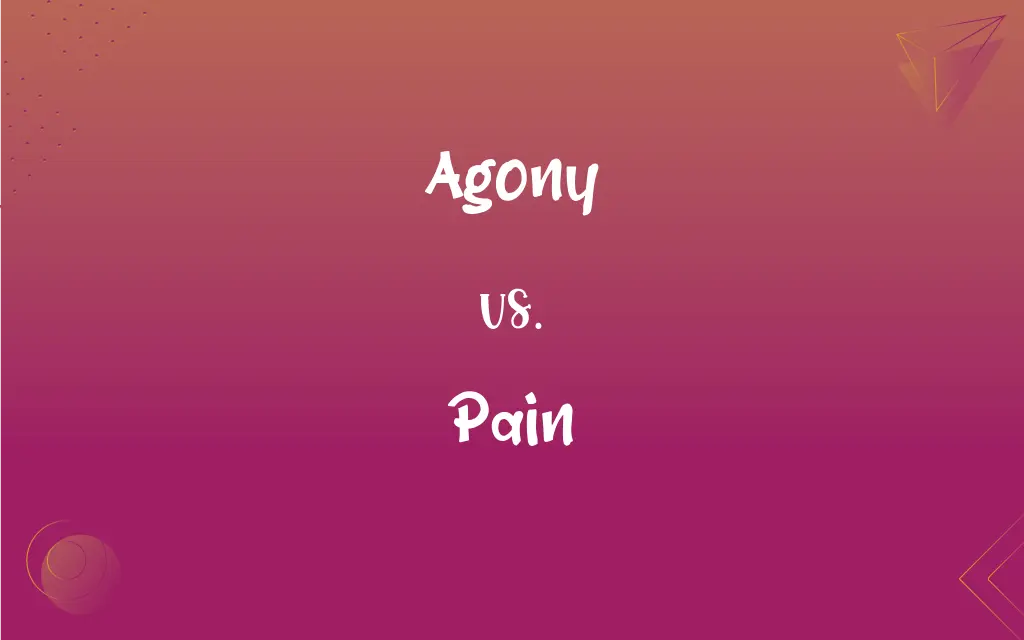Agony vs. Pain: What's the Difference?
Edited by Aimie Carlson || By Harlon Moss || Updated on November 29, 2023
Agony is intense, often prolonged pain, or extreme suffering, while pain is a physical or emotional discomfort sensation.

Key Differences
Agony refers to an extreme level of pain that is often enduring and intense, while pain is a broad term that describes an unpleasant sensory and emotional experience.
Agony implies a more severe, often unbearable level of pain, frequently coupled with a sense of despair, pain, however, can range from mild to severe and can be acute or chronic.
Agony is pain at its most extreme, encompassing both physical torment and profound emotional distress. On the other hand, pain is a universal experience, often a symptom of an injury or illness.
Agony requires more intensive management, often needing both physical and psychological interventions, whereas the treatment of pain varies based on its cause and intensity.
Agony also a form of pain, can dominate a person's experience, overshadowing all else, while pain serves as a warning signal of harm or potential harm to the body.
ADVERTISEMENT
Comparison Chart
Intensity
Extremely high
Can range from mild to severe
Duration
Often prolonged
Can be acute or chronic
Emotional Impact
Usually involves deep emotional suffering
Emotional impact varies
Physical Sensation
Intense and often unbearable
Varies based on cause and severity
Treatment and Management
Requires comprehensive physical and psychological care
Treatment varies by cause and intensity
ADVERTISEMENT
Agony and Pain Definitions
Agony
Extreme and prolonged pain.
He was in agony after the accident.
Pain
Emotional distress or suffering.
His words caused her great pain.
Agony
Intense emotional or mental suffering.
The loss left her in agony.
Pain
A physical sensation caused by illness or injury.
She felt a sharp pain in her leg.
Agony
A situation or experience causing severe pain.
The marathon was pure agony for him.
Pain
Aching or discomfort in the body.
The long hike left him in pain.
Agony
Acute physical or emotional torment.
The news of the disaster plunged them into agony.
Pain
An unpleasant sensory experience.
He experienced pain when touching the hot surface.
Agony
A state of intense distress.
She experienced agony during the difficult decision.
Pain
A symptom of physical or emotional ailment.
The patient described his pain to the doctor.
Agony
The suffering of intense physical or mental pain
The injured soldier writhed in agony.
Pain
An unpleasant feeling occurring as a result of injury or disease, usually localized in some part of the body
Felt pains in his chest.
FAQs
Can agony be emotional?
Yes, it can refer to intense emotional suffering.
How is agony different from general pain?
Agony is an extreme form of pain, often more intense and prolonged.
What is agony?
Extreme, often prolonged physical or emotional pain.
What is pain?
A sensation of discomfort or distress, either physical or emotional.
Is agony a medical term?
It's used more broadly, not specifically in medical contexts.
How do doctors assess pain?
Through patient description, scales, and observation.
Is agony always severe?
Typically, yes, it implies severe suffering.
Can pain be a symptom of illness?
Yes, it often indicates an injury or illness.
Is pain always physical?
No, it can also be emotional.
Can both agony and pain be treated?
Yes, but agony may require more comprehensive treatment.
Are there different types of pain?
Yes, including acute, chronic, neuropathic, and more.
How do individuals experience pain differently?
Due to factors like genetics, environment, and psychology.
Can agony affect mental health?
Yes, prolonged agony can impact psychological well-being.
Is there a limit to human agony?
It's subjective and varies greatly among individuals.
Can emotional pain lead to physical agony?
Yes, severe emotional distress can manifest physically.
Is pain always a bad thing?
It's often a protective mechanism, alerting us to harm.
Can pain be measured?
Subjectively, through patient self-report and scales.
Do painkillers work for agony?
They can help, but additional interventions are often needed.
Is chronic pain the same as agony?
Not necessarily; chronic pain can be less intense than agony.
Can one become immune to pain?
Not immune, but tolerance levels can vary.
About Author
Written by
Harlon MossHarlon is a seasoned quality moderator and accomplished content writer for Difference Wiki. An alumnus of the prestigious University of California, he earned his degree in Computer Science. Leveraging his academic background, Harlon brings a meticulous and informed perspective to his work, ensuring content accuracy and excellence.
Edited by
Aimie CarlsonAimie Carlson, holding a master's degree in English literature, is a fervent English language enthusiast. She lends her writing talents to Difference Wiki, a prominent website that specializes in comparisons, offering readers insightful analyses that both captivate and inform.































































